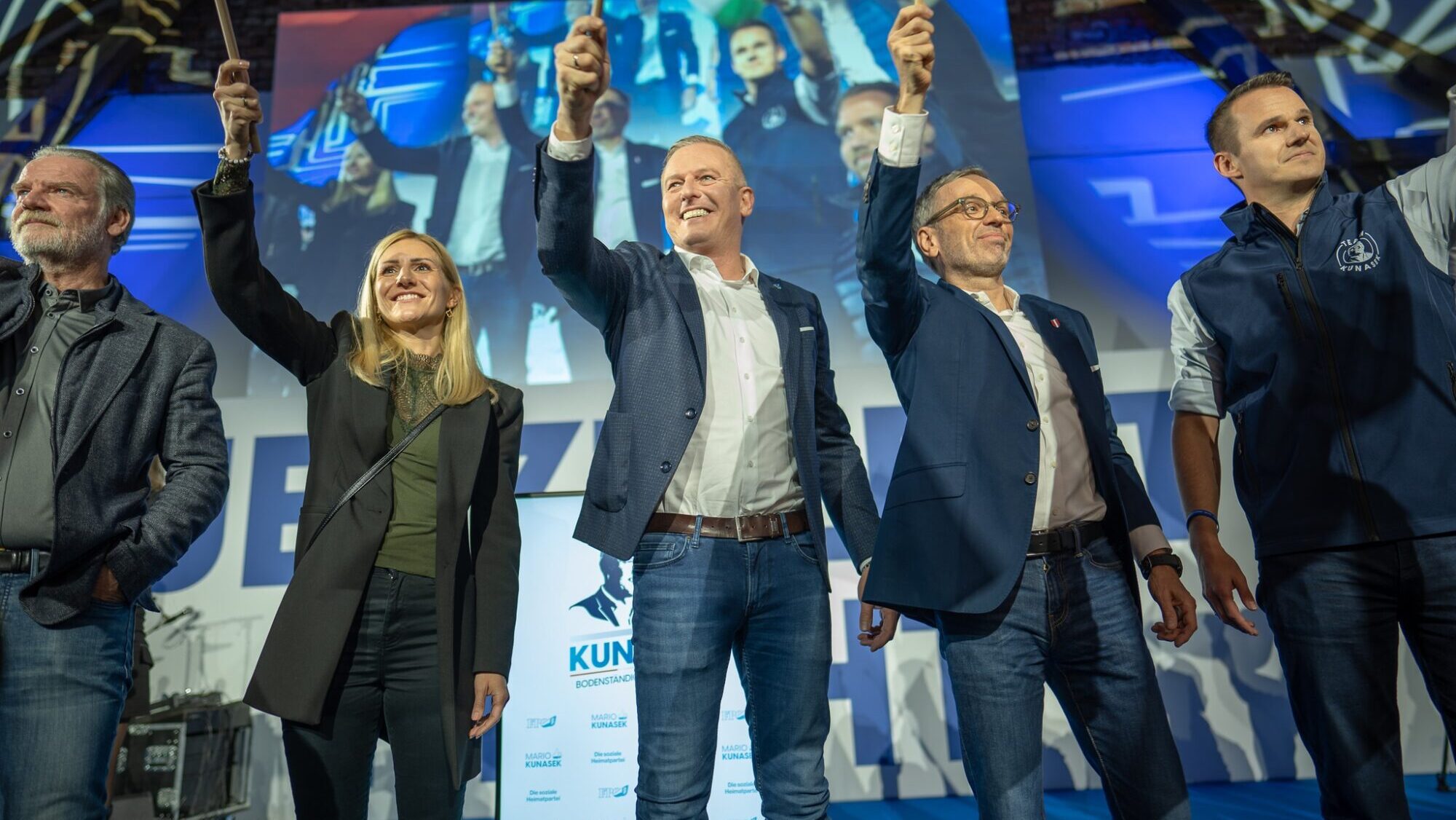
Mario Kunasek (center) and Herbert Kickl (2nd right) celebrate the regional election victory with other party members.
The right-wing Freedom Party of Austria (FPÖ) has extended its series of electoral victories with a massive win at the regional election in the state of Styria on Sunday, November 24th.
Following wins at the European Parliament elections in June and the national elections in September, the FPÖ, which has campaigned on an anti-immigration platform, easily won in Styria, exceeding expectations by gaining 35% of the votes, doubling its result of five years ago (17.5%).
Ergebnis der Steiermark-Wahl vor Auszählung der Briefwahl.
— Berti, der Sozifresser (@Sozifresser2) November 24, 2024
Die Verdoppelung des Stimmanteils durch die FPÖ ist erstaunlich. Plus 17,5 Punkte! Die guten Steirer mögen wohl nicht, was Bello mit der FPÖ veranstaltet hat und eine Ampel wolen sie sicher auch nicht. pic.twitter.com/kZyVdD9T7Y
FPÖ lead candidate Mario Kunasek’s campaign focused on anti-immigration rhetoric and defending car owners.
The centre-right People’s Party (ÖVP) dropped almost ten points to land in second place with 27%, and the Social Democrats (SPÖ) came third with 21%, a 2-point dip compared to 2019.
It is the first time since World War II that neither the ÖVP nor the SPÖ have won in the state bordering Slovenia.
Herbert Kickl, leader of the FPÖ, said the citizens of Styria had voted for change, for a party that embraces patriotic policies and social justice, and that they had clearly signalled their dismissal of the “coalition of losers”—i.e., the ÖVP and the SPÖ, who have governed Styria together for decades, and who are also on the verge of forming a federal coalition government together with the liberal NEOS party.
Kickl has been extremely critical of the ÖVP, especially its leader Karl Nehammer.Instead of reaching out to the FPÖ, the winner of the national elections in September, to form a centre-right coalition government—something the electorate had clearly desired—Nehammer decided to veer to the left and restore the ‘grand coalition’ with the leader of the SPÖ, Andreas Babler, a self-proclaimed Marxist.
The ÖVP, the SPÖ, and NEOS officially started negotiations on forming a government last week.
It seems that the voters in Styria wanted to punish Nehammer, and came out in droves to support the FPÖ, which months ago was polling below 30%. The outrage is visible in nationwide polls, too, where the party has climbed from 29% to 34% in recent months, while the ÖVP’s popularity has dropped from 26% to 23%.
“If you play unfair, you will be punished,” Governor of Styria, ÖVP’s Christopher Drexler said after the humiliating election defeat, stressing that he was the victim of national party politics. He blamed Austrian President Alexander Van der Bellen for tasking Karl Nehammer in October with forming a government, not Herbert Kickl, the winner of the national elections.
Nehammer’s choice of snubbing the FPÖ is also inexplicable, given that there are currently three Austrian states—Lower Austria, Salzburg, and Upper Austria—which are ruled by ÖVP-FPÖ coalitions, and there will soon be a fourth one following the October state elections in Vorarlberg.
In Styria, after Sunday’s election, the outgoing ÖVP-SPÖ-government will not have enough seats in the state parliament to continue working together, raising the question of whether the centre-right will turn to the right-wing FPÖ to form a coalition. “It remains to be seen whether this crushing election defeat will give the reasonable voices in the ÖVP the courage to correct Nehammer’s swing to the left,” Herbert Kickl remarked.
